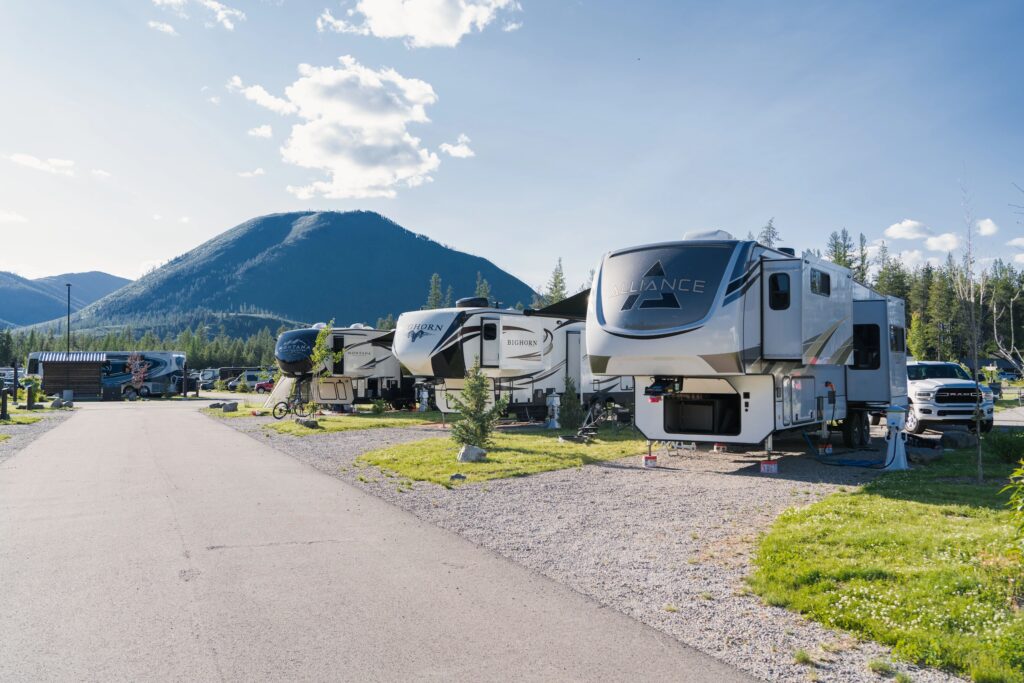The idea of owning a campground is an exciting one. Over 40 million Americans are RVers, and campgrounds are where these travelers hang their hats. RV ownership has reached record highs since 2020, meaning the demand for campground space exceeds supply in many parts of the country.
RV parks and campgrounds can be built from scratch, or an existing park can be purchased and improved. Campground owners build a business that helps shape the RVing adventure, creates lasting memories for families, and—when done right—generates healthy profits.
But before buying an existing campground or building a new one, factor in the hidden costs of ownership. This post breaks down those hidden costs for a more complete picture to guide the decision-making process.
16 Hidden Costs Of Owning A Campground
1. Infrastructure
Buying an existing park means buying its current problems. Secondhand campgrounds may include a patchwork of costly repairs and upgrades for septic systems, plumbing, electrical, and more.
On the other hand, building a park from scratch can incur unexpected costs when installing complex amenities like advanced septic systems and shower houses that were not in the original budget.
When purchasing or building, budget for the unexpected.
2. Lodging taxes
Many states and municipalities charge a nightly tax for short-term stays. Campgrounds will usually fall under this umbrella and you will need to pay taxes for each camp night at the park. These taxes are an important hidden cost that owners generally pass on to guests.
3. Web expenses
Campgrounds need nice-looking, functional websites. DIY websites can work, but new owners will often hire this out–a worthwhile but oftentimes unexpected cost.
4. Insurance
Insurance costs factor into the budget of any new business plan, but campground ownership brings unexpected twists. For example, when purchasing an existing campground, older buildings and infrastructure generally result in higher premiums.
Amenities such as playgrounds and trails can also increase insurance rates.
And—most alarmingly—campground insurance is audited by carriers every year. If a campground makes more revenue than projected for a given year, insurance carriers will charge a backdated increase in premium.
5. Licensing, permitting, and zoning
States and municipalities will charge fees for campground operation and infrastructure.
Want to add additional sites? The area might need to be rezoned, new water licenses might need to be issued, and new sewer connections applied for and approved.
Want to start a camp store or offer new activities? There will likely be new taxes and licenses required for such operations.
Want to build a new campground? Costly permitting and planning might be required from the state and county.

6. Property taxes
Campground property taxes can often be higher than you might expect. The size of the campground, location, and any additional operations (e.g. camp store, pool, trails, etc.) can all lead municipalities to charge higher than usual property taxes to campgrounds.
7. Design costs
Building a new campground involves more than building expenses. Consulting and engineering fees to design a campground, plan the sites, and map out infrastructure can cost tens of thousands of dollars.
8. Fast, reliable Wi-Fi
RVers expect to be connected at camp. Many campgrounds are in remote areas where installing internet infrastructure can be more costly than expected.
9. Utilities
Utilities are a normal part of any business budget, but campgrounds often incur unexpected utility costs during abnormally hot or cold times. As a result, some campgrounds opt to charge extra utility fees to guests.
10. Cancellations
RVers are transient by nature and their plans can change on a dime. Cancellations become a hidden campground cost because it can be difficult to rebook a site on short notice. Owning a campground requires you to be somewhat flexible when it comes to expected income.
Campground owners can charge cancellation fees or require a reservation deposit to alleviate this problem.
11. Employee expenses
Team turnover, unexpected customer service issues, and more can all lead to higher-than-expected expenses.

12. Grounds care
Campground upkeep involves more than mowing the lawn. RVers appreciate well-cared-for and individualized sites that can result in higher-than-expected costs for grounds care.
13. Card fees
Credit card companies and credit card processing services have become necessary for campground owners. Card and processing fees add up, taking anywhere from 2.5% to over 8% of every transaction.
14. Commissions
It’s often in a campground’s best interest to be listed on third-party sites like Good Sam, Campnab, Airbnb, and more. These sites will increase a park’s reach and generate bookings that might not otherwise happen.
These third-party marketplaces charge campgrounds a percentage for every booking, resulting in added expense for campground owners.
15. Software costs
Most modern campgrounds use reservation software to manage bookings and payments. These services can range in cost from $50 to over $250 per month. Some services also take a percentage of any bookings made directly on the campground’s website.
16. Marketing expenses
A marketing budget is part of most businesses, and campgrounds stand to benefit from marketing outreach efforts. But campgrounds in remote areas or parks that don’t have the usual amenities might incur above-average marketing costs to expand their reach.
For example, RV parks that are off the beaten path might invest additional resources in creating and marketing glamping experiences to draw people in.
*
Campground ownership is an exciting opportunity with a growing customer base. Success in any business requires one to have a clear idea of projected expenses, revenue, and profits. By understanding the hidden costs of owning a campground, prospective park buyers will set themselves up for success as they welcome campers of all types and stripes.